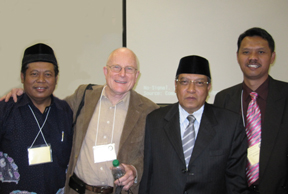Indonesia – Syamsul Arifin and H. Marsudi Syuhud Sahudi

Joe Hepworth
Research Advisor
H. Marsudi Syuhud Sahudi. General Secretary Sahudi discussed living in harmony in religious diversity in Indonesia. Indonesia consists of 17,000 islands, 6,000 of which are inhabited. Of the total nearly 10 million kilometers, almost 8 is water. Less than 20% is land. Biggest Muslim population. 248 million people. Indonesia is the 4th most populous country with at least 300 ethnic groups. 737 living local languages are spoken.
The majority religion is Islam. Indonesia has the largest Muslim population in the world. But the Indonesia constitution is not based on Islam. Indonesian democracy is guided by the inner wisdom of the represented and social justice. Indonesia is not an Islamic state. But if something is not consistent with Islamic value, it will not be permitted. If it is not contrary to Islamic value, it will be acceptable for other religions. For example, because the Indonesian banking system is not in conflict with Islamic law, it is acceptable. Indonesia does not have capital punishment.
Professor Syamsul Arifin discussed his experience in developing a human rights program. The program will begin in March 2012. It was developed in the setting of the discrepancy between hopes and reality. Humans have dignity, a great gift from God. For religious people, they know from scriptures that teachings for all people are to be tolerant and work together with other religions.
Islam, as one of the largest religions of the world, teaches tolerance toward other religions. But in the reality of human interactions, we often meet paradoxes. The recent religious conflicts are at odds with human rights. The cause is the misunderstanding of others’ religions.
To address this misunderstanding, Professor Arifin developed a master’s level course with the general objective of providing knowledge about intersections, harmonies and conflicts that arise between Shari’ah and Human Rights, from the perspectives of law, philosophy, and history, discussing how Shari’ah and human rights are complementary but also may be in conflict.